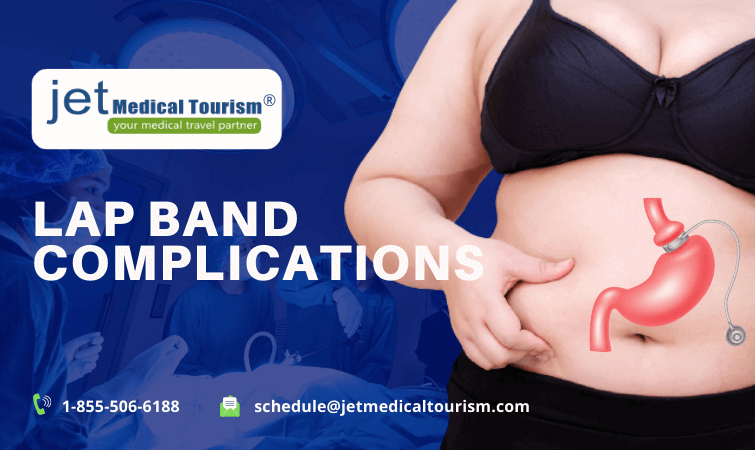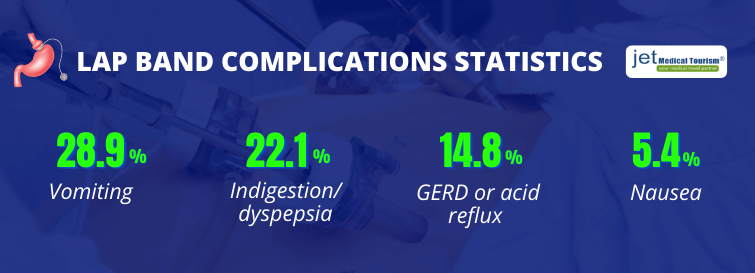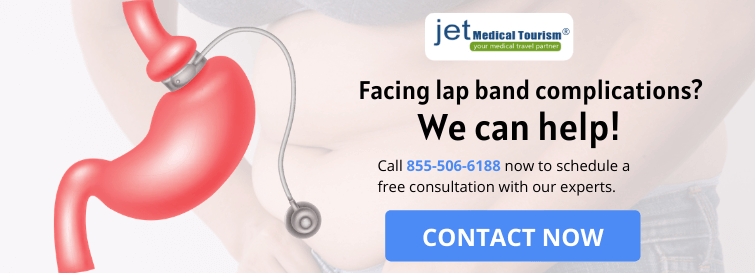Lap Band Complications

Lap band complications may occur in a significant number of patients at some stage after the adjustable gastric band surgery. In addition to the mild or temporary lap band surgery side effects, some patients may experience more serious adverse health events. Lap band slippage, erosion, leakage, and other problems may occur with the band device itself. In many cases, lap band complications year later may appear inexplicably.
Although the gastric band surgery is less invasive and involves minimal risk, the high rate of lap band complications have resulted in a reduce popularity of this surgery. Weight loss failure rates are substantially high because very strict long-term compliance with dietary guidelines is required. But even when the patient is fully dedicated to maintaining their diet, the risk of lap band side effects, and complications cannot be ruled out.
Are you experiencing lap band complications or unable to achieve weight loss? Our bariatric surgeons at Jet Medical Tourism® can provide you the right solutions. Contact us now!
Is lap band safe?
At the time of your pre-operative consultation, one of the key questions to ask would be: Is lap band safe? Although laparoscopic gastric adjustable lap band (LAGB) surgery is less invasive and less risky than other procedures, it has a high rate of lap band complications. Lap band surgery mortality rate is extremely low. The FDA has approved the procedure for the treatment of obesity.
However, post-surgery lap band issues are numerous and long-term gastric band failure rate is high. Infection due to gastric band procedure or other band-related problems may occur at any stage. A large number of patients report persistent lap band surgery side effects. For your own safety, you should diligently follow your surgeon’s dietary guidelines and watch out for lap band rejection symptoms.
Lap band surgery side effects
Temporary lap band side effects after the surgery will include soreness, swelling and mild bruising in the incision sites. These can be managed with prescription pain medications. However, more serious lap band surgery side effects may appear in some patients within a few weeks or months after the surgery. Some patients may also face serious lap band issues years after their surgery.
High incidence of side effects is one of the key negatives of lap band surgery. Patients commonly encounter nausea, vomiting, indigestion, acid reflux, dehydration, and constipation after the procedure. Weight loss failure and weight regain are other challenges you may face. You can minimize your lap band complications by avoiding fatty foods and overeating. Some of the potential lap band surgery side effects include:
- Lap band leakage, erosion, slippage, or damage
- Dyspepsia or indigestion
- Nausea, vomiting, bloating and gas, and stomach pain
- Esophageal dilation
- Constipation and other changes in the bowel function
- GERD or acid reflux
- Food intolerance
- Port problems
- Hiatal hernia
- Bowel perforations
- Blood clots
- Ulcerations in the band site
- Gallstones
- Food trapping
- Pouch dilation
- Pneumonia
Lap band complications
Lap band complications may occur due to a number of reasons. If you chose a less experienced bariatric surgeon for this procedure, they could make errors in band placement. This can lead to lap band surgery failure or cause health troubles. Another key cause of lap band complications is the patient’s inability to maintain a balanced and nutritious diet. This can create a range of lap band side effects and complications at any stage.
Lap band complications years later
Lap band complications years later may include:
- Weight loss plateau, insufficient or no weight loss, or weight regain
- Lap band rejection symptoms in the short or long run
- Dumping syndrome
- Stomach pain after eating
- Infection due to gastric band procedure
Lap band complications after 5 years
Lap band complications after 5 years may include:
- Severe bloating, heartburn, or excessive nausea
- Inflammation of the esophagus
- GERD or acid reflux
- Lap band leakage, resulting in weight loss failure
- Lap band intolerance, which may occur due to physiological reasons
Lap band complications after 10 years
Lap band complications after 10 years may include:
- Band erosion, which may cause damage to the stomach tissue
- Lap band slippage or migration from its original position
- Lack of movement or dysmotility of the esophagus
- Development of gallstones
- Lap band causing autoimmune disease
RELATED READ: Lap band removal after 10 years: Everything you need to know
Lap band complications statistics

Researchers have compiled and studied lap band complications statistics over the years. These statistics reveal a high rate of lap band surgery complications, which discourages most surgeons from recommending this procedure to patients. According to some researchers, lap band surgery failure rate may occur in about one in four patients at some stage after the procedure.
An advisory report published by the FDA indicated that vomiting is the most common among lap band side effects (28.9% of all patients). It is followed by indigestion or dyspepsia (22.1%) and GERD or acid reflux symptoms (14.8%). About 5.4% of all patients may also experience nausea after lap band surgery. The medical experts have suggested that lap band complications can be reduced by following recommended best practices.
Lap band surgery failure
According to a research study published by the National Institutes of Health, lap band surgery failure rate is as high as 44%. The failure occurs either because of insufficient weight loss or unmanageable lap band complications. Considering the high gastric band failure rate, the authors of this study go as far as suggesting that lap band surgery should not be recommended as a primary weight loss surgery for most obesity patients.
Apart from lap band slippage, erosion, leakage, and other device related lap band issues, insufficient weight loss and weight regain are major problems. Compared to other bariatric surgeries, LAGB results in less weight loss.
Moreover, studies have found that weight regain is one of the serious long term effects of lap band surgery. Therefore, when considering the question “Is lap band safe,” it is also important to evaluate the lap band success rate.
Lap band complications vomiting
Among all types of lap band complications, vomiting is the most common concern. Nearly one-third of all patients who undergo an adjustable gastric band surgery may experience this problem. Vomiting results in a forced emptying of the stomach. As a consequence of vomiting, your stomach exerts more pressure to try to retain the food and digestive juices inside.
Vomiting may be accompanied by nausea, which is another of lap band surgery side effects. These complications may be short lived but acute for some patients. But in many cases, the condition may be prolonged or recurrent. If you frequently experience lap band complications vomiting, it can be debilitating and cause discomfort in the upper abdomen, chest, and throat.
Lap band causing autoimmune disease

Lap band causing autoimmune disease is one of the potential long term effects of lap band surgery that should be considered. While researchers do not have sufficient data to conclusively establish a correlation between gastric band and autoimmune disease, they do recommend caution. Long-term use of implanted silicone devices such as an adjustable gastric band can result in some types of medical disorders. Abundant caution is always better when considering this surgery.
Even in the absence of conclusive clinical evidence, medical experts recommend that if you develop the symptoms of autoimmune disease following the surgery, you should consider lap band removal. Similarly, if your bariatric surgeon finds that you have pre-existing symptoms of autoimmune disease, they should treat it as a contraindication for lap band surgery. In other words, to avoid lap band issues, do not choose LAGB surgery if you exhibit signs of autoimmune disease.
CHECK THIS OUT: What is lap band removal surgery?
Lap band heartburn pain

Lap band heartburn pain is a functional symptom of problems with the GI tract. If your stomach, esophagus, or the initial portion of your small intestine functions in an abnormal manner after your lap band surgery, you may suffer from frequent heartburn. Lap band heartburn pain could become a chronic condition, with the symptoms fluctuating in their intensity and frequency. You may experience this problem for days or weeks consecutively followed by brief intervals of relief.
Gastric band acid reflux
Reflux after lap band surgery may occur when the band exerts too much pressure on your upper stomach. If your esophagus is already weak or loses its tissue strength following the surgery, your condition of gastric band acid reflux may worsen. Unless you undergo a lap band removal or conversion to another bariatric surgery, this condition may over time cause damage to the esophagus lining. This can happen because the gastric acid will keep coming back up from your stomach.
YOU MIGHT ALSO LIKE: Should you consider lap band to gastric sleeve conversion surgery?
Lap band and bloating
Lap band and bloating often go together. Abdominal bloating after this surgery may occur when your GI organ gets filled with gas. You may experience a feeling of tightness or swelling your abdomen. Sometimes the abdomen may feel hard and painful. Flatulence, belching, and burping are common symptoms of lap band and bloating. To minimize this problem, you should avoid certain veggies and fruits that typically cause gas in the stomach. These may include asparagus, cabbage, broccoli, cauliflower, banana, pear, apricot, and peach.
Lap band and diarrhea
Lap band and diarrhea is a common condition, which may occur intermittently after your surgery. It is not necessarily severe in every case, but will cause some discomfort. However, if your diarrhea after lap band persists, you will be at a risk of dehydration unless you get treated. In most cases, you should be able to manage lap band and diarrhea with some dietary adjustments. If you suffer from lactose tolerance, it could manifest in the form diarrhea after a gastric band surgery.
Lap band food stuck
Lap band food stuck is a relatively rare complication that may occur in about two percent of the patients after the surgery. Even when the lap band slippage has not occurred, food trapping can take place. This happens because the stomach opening will become narrower due to the constriction caused by the band and the surrounding scar tissue. Therefore, small fragments of foods can get stuck in this narrow stomach opening.
Causes
- The patient eats excessive fatty or hard foods or eats without proper chewing
- The scar tissue becomes tight due to natural causes, resulting in constriction of the stomach opening
- The surgeon placed the gastric band more tightly than required
- Swelling of the stomach may occur with sudden change of altitude, making the lap band too tight
Consequences
- Stomach discomfort, gas formation, and feeling of nausea
- The patient may start vomiting in an attempt to release the pieces of food
- Increased risk of acid reflux or GERD due to lap band food stuck
- Poor tolerance to food until the lap band is removed or fluid is release from the band
Long term effects of lap band surgery
Long term effects of lap band surgery are favorable only in about 50 to 60 percent cases. For the remaining patients, lap band complications may force them to go for a revision surgery or band removal. Studies indicate that almost 50 percent of the gastric bands will be removed within 7 to 10 years because of poor weight loss or other lap band surgery complications.
- Weight Loss Failure: Insufficient weight loss or weight regain is one of the most common and adverse long term effects of lap band surgery.
- Lap Band Erosion: Over time, the gastric band erosion may occur. This will often lead to long-term infection in the port or band area.
- Lap Band Slippage: Slipping or migration of the band is a serious lap band side effect, which may require emergency band removal.
- GI Tract Issues: One of the common lap band long term complications is problems with the GI tract, such as indigestion, reflux, or heartburn.
RELATED READ: Lap band slippage: Causes, symptoms, and treatment
Lap band after gastric bypass complications
Lap band after gastric bypass complications may vary from one patient to another. But two of the most common lap band complications symptoms in this case include dehydration and constipation. Patients should consult with their bariatric surgeon if these symptoms persist.
- Dehydration: If you are not drinking adequate water, you will be at the risk of dehydration as one of the lap band after gastric bypass complications. Urine output will reduce in this case and urine color will become deep yellow. You will also experience symptoms, such as dry mouth, muscle cramps, heart palpitations, weakness, and nausea.
- Constipation: If you are having fewer than three stools in a week following your surgery, you are medically suffering from constipation. This lap band after gastric bypass complication will be marked by discomfort in the lower abdomen, small or hard stools, and physiological distress. Unless you get treated, you may develop anal fissures and rectal bleeding.
Lap band with plication complications
Lap band with plication complications may include bleeding, infection, organ injury, leakage from the incision line, and bowel perforations. You will be at a risk of these complications if you choose a combination of gastric band surgery and gastric plication. As part of the plication procedure, your surgeon will fold the stomach on itself to reduce its volume.
The surgeon will use sutures to keep the folded stomach in its place. Thereafter, they will place a gastric band around your upper abdominal area. Lap band with plication complications occur when leakage develops in the suture line that was applied to fold the stomach. This can cause infection or bleeding. In a few cases, bowel puncturing may also occur during the surgery.
Lap band pregnancy complications

Lap band pregnancy complications are rare, but you should discuss your options with the surgeon if you are planning a pregnancy after your gastric band surgery. Some of the potential lap band issues after pregnancy may include:
- Changes to Bowel Function: Irregular bowels or constipation may occur during your pregnancy. You can usually improve or prevent it by increasing your daily water and fiber supplement intake.
- Difficulties in Swallowing: If you eat your food too fast during pregnancy, you may experience dysphagia or swallowing difficulties. Eat small portions and chew food thoroughly to avoid this problem.
- Food Intolerance: This is one of the common lap band pregnancy complications. Follow good dietary practices as advised by your surgeon and avoid certain foods to minimize food intolerance during pregnancy.
Esophageal dilation after lap band surgery
Esophageal dilation after lap band surgery can occur in up to 15 percent of the patients. Clearly, this is one of the most common lap band complications you should be aware of. In this condition, your esophagus will enlarge, causing various gastric troubles. Esophageal dilation after lap band surgery usually occurs within five to seven years of the band placement. Consequences may include:
- Dilation of the esophagus will cause it to lose its regular function of pushing the pieces of food down to your stomach.
- The valve between the stomach and the esophagus will become weaker.
- You may experience difficulties in swallowing food or water.
- Vomiting, acid reflux, and a progressive worsening of nausea and heartburn may occur.
- Lap band deflation or removal may be necessary.
Tips to avoid lap band issues
Lap band issues can be minimized if you remain committed to the recommended dietary practices and follow a healthy lifestyle. The first priority should be to choose a bariatric surgeon who can perform your laparoscopic adjustable gastric band surgery with precision. Correct band placement will reduce your lap band complications years later. However, if lap band issues do occur despite all precautions, here’s what you can do.
- Lap Band Intolerance: Sometimes your body may be just not ready to handle a foreign object. If you feel a constant sense of discomfort or develop frequent nausea and vomiting, permanent lap band removal may be the right thing to do.
- Lap Band Erosion: This problem may also occur naturally even if you have followed all precautions. In this condition, the band will start growing into your stomach tissue. If this happens, consider a revision surgery or lap band removal.
- Lap Band Leakage: Up to five percent of the patients may develop gastric band leak at some point after the surgery. Your surgeon will perform a colored x-ray to diagnose the leak. They may recommend a surgical repair to stop the leakage.
- Lap Band Slippage: This is one of the most common lap band issues that may occur in up to 18 percent of the patients. In this condition, the lower portion of your stomach may slip from the band. Surgical repositioning or band fluid removal may solve this problem.
CHECK THIS TOO: Lap band revision surgery in Mexico
Lap band removal after complications
Lap band removal after complications may be a solution of the last resort. If the surgeon determines that adjusting the band or surgical repair will not resolve the long term lap band side effects, they may recommend band removal. Here are the steps involved in a lap band removal after complications:
- Administer anesthesia to put the patient to sleep.
- Create small incisions in the abdomen (preferably use old incisions).
- Insert a tiny laparoscope and other surgical instruments through the incisions.
- Remove the scar tissue enveloping the band and cut the tubing.
- Pull the gastric band out.
- Remove the original surgery sutures from the upper stomach.
- Remove the subcutaneous port.
- Perform a revision surgery (depending on the surgical plan).
- Close the incisions with dissolvable sutures.
- Bring the patient out of anesthesia and move them to an observation area.
Suffering from lap band complications? Consider lap band revision from Jet Medical Tourism®
Lap band complications can occur at any time after your gastric band surgery. However, you do not have to be in despair because of weight loss failure or unwanted side effects. At Jet Medical Tourism®, our highly skilled and compassionate bariatric surgeons can provide you a lap band revision surgery.
You can easily get rid of your lap band surgery complications and go on to achieve your weight loss goals with a safe and proven revision bariatric procedure. To learn more about how we can help you, talk to us today. You can also schedule a free consultation with one of our top surgeons. Call now!



